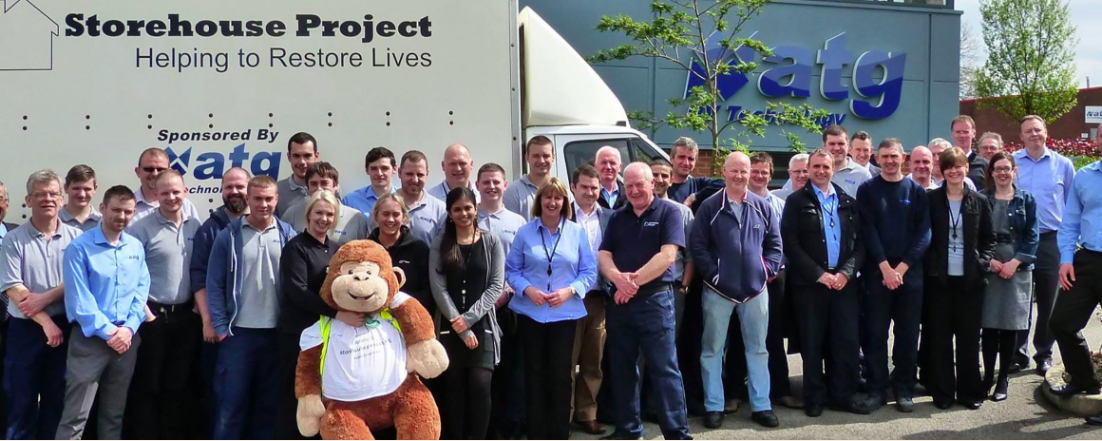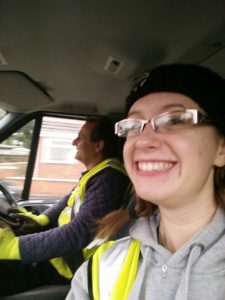
03 Oct Providing Support to People in Crisis in England
Rachel explains how Storehouse helps turn the lives around of people in crisis through simple acts of support.
On my first day at the Storehouse Project, my new coworker sat me down in the small meeting room that also doubled as our office. As she began running through the general duties we had, I took in my new workplace. One small desk, two sofas, an archaic Samsung flip phone, and a clipboard. I’d applied to work as a centre manager here after finishing a Discipleship Training Program with YWAM in Hong Kong, where I’d realised my heart for the poor and broken and wanted to spend my life serving them. The Storehouse was tiny then; we had 2 drivers who would make 4 or 5 deliveries per day to people on low incomes in the Wigan and Leigh area. A sofa, maybe, or something basic, like a can opener or some bedding. We worked alongside other agencies, arranged deliveries, and welcomed caseworkers into our centre (a basement in the church we were based in) to collect food parcels and clothes. We also had a ‘GRACE shop’ which church members were welcomed into every Sunday.
I loved that feeling of providing people with something they really needed but didn’t have the ability to get themselves. Of course, you have difficult clients, who might complain because the sofa we gave them was ‘the wrong colour’, but they are few and far between. The most asked question when calling clients was, “Is this really for free?” It was so rewarding to hear from case workers how families could be reunited because the mother now had basic furniture that was required for the children to visit, or that a client felt so much better they’d actually made it to a job interview. But for the first few months, I never actually saw the situation some of these individuals and their families were in. That all changed the day one of our drivers called in sick and I offered to step in and help deliver furniture. I genuinely believe that was the best thing I did; not only did I see ways we could improve our service, I also saw some of these families. And I will never forget the first family we went to; a young couple with a little baby who had just been granted refugee status and had been given a council house. These houses were always empty with concrete floors and, as with many of our families, this family had no savings to buy furniture. We took some basic furniture, a ‘starter pack’ with plates, cutlery, towels, bedding etc., and some baby items. As we walked into the house with the first sofa, I was overwhelmed by how dark and unwelcoming this house was. Bare walls, no curtains or carpet, no furniture. The woman was sat halfway up the stairs cradling her baby, staring at us fearfully. We unloaded our items and helped to put them where the father wanted them, trying to communicate through broken English and hand gestures. As we were finishing, the mother appeared and simply said, ‘Thank you’. But the emotion in her voice brought tears to my eyes. Somehow actually meeting the people we were helping stabbed at my heart in a way talking to them on the phone couldn’t.
There have been other clients over the two years I worked there that left an imprint on me, like a man who was sleeping on a dog bed because he had nothing else, and a recent widower with eight children who could not work and thus feed his children because his asylum application was pending. The Storehouse exploded over the two years I worked there, expanding the number of drivers and vans, opening a GRACE shop in the local community, expanding into courses we could offer clients in basic job skills and competences. We became much more efficient at what we did, and we began to gain recognition in the community and the council for the work we were doing. But the clients never changed; they were always desperately in need, and the goal was always to help them, and through that show them their worth. We began doing follow up calls, to make sure everything was working well and that they weren’t in need of anything else. We got volunteers on board to go to people who were interested in house visits, because we encountered so many isolated and lonely people. We employed former clients and watched joyfully as they regained confidence and were changed from the inside out.

I stopped working for the Storehouse when I got married and moved to Norway, but that feeling of being able to make a difference – physically but also in terms of helping people realise their value – has stuck with me. Norway is a very different country, and people don’t need the same type of support, but I’m volunteering with the Red Cross and hoping to work in migration and integration eventually. So many migrants experience loneliness and isolation and just need to be heard and valued. And the Storehouse is going from strength to strength, with a wonderful team of volunteers and staff who care more about the heart of a person than how many referrals they manage to complete in one day. Focusing on the individual is so essential to unlocking their worth and potential, and there is nothing like seeing someone blossom when they realise they are valuable, they are loved, and they are seen.
Rachel Hasting graduated from the University of St Andrews in 2013 with a degree in Psychology. She is currently studying for a masters in Health Economics, Policy and Management at the University of Oslo and is interested in migration, information communication and access to care.




No Comments